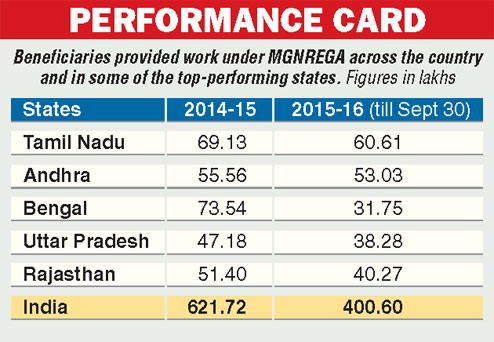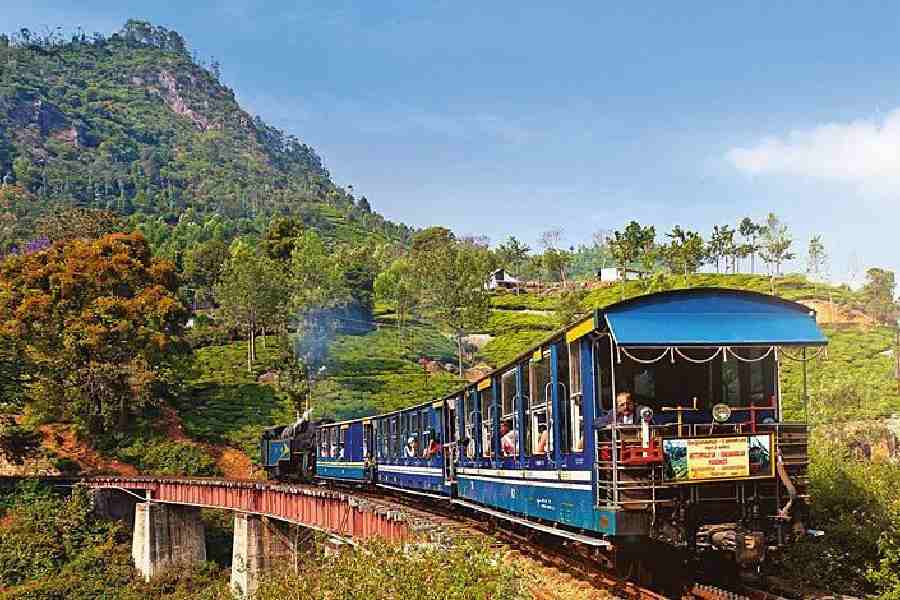
New Delhi, Dec. 4: The national rural employment scheme is set to allow use of labour-displacing machinery in all activities in a move that, social activists say, would defeat the objective of guaranteed 100 days' work to a rural household.
The rural development ministry is set to amend its guidelines under the Mahatma Gandhi National Rural Employment Guarantee Act (MGNREGA) to allow use of machinery such as JCBs, rollers, mechanical mixers and mechanical augers, which could reduce the scope of manual work substantially.
Sources said the government would bring in the changes in view of demands from several state governments, mainly Punjab and Haryana, where work under the scheme is affected because there are not too many takers for it in view of the "low wage rate".
States like Tamil Nadu, Uttar Pradesh, Bengal, Rajasthan and Andhra Pradesh are doing well in providing benefit to a maximum number of people under the scheme.
Punjab and Haryana have performed dismally, providing employment to only 3.02 lakh and 1.51 lakh job card holders respectively till September this year, as compared to 60.61 lakh in Tamil Nadu.Last year, the two states provided work to 3.38 lakh and 3.26 lakh people respectively. Punjab has over 11 lakh job card holders, Haryana has a little less than 7.5 lakh while Tamil Nadu has more than 82 lakh. The daily wage rate in Punjab is Rs 210, in Haryana it is Rs 251 and in Tamil Nadu Rs 183.
"As workers are not keen to work, the implementation of MGNREGA is abysmal in the northern states. They have been demanding use of machinery under the labour component. It may be allowed under fresh guidelines," the source said.
Rural development minister Birender Singh confirmed that the proposal is under consideration. "No decision has been taken yet. I do not want to comment at this stage," Singh told this paper.
The scheme, started in 2006, allows expenditure up to 40 per cent on material while 60 per cent has to be on manual labour. Machine use is allowed in all activities under the 40 per cent material component. It is also permitted under the labour component for certain types of work that cannot be done manually. No contractor is allowed.
Nearly 13 crore rural households have got job cards under the scheme and are entitled to get work for 100 days in a year. The objective of the scheme is to check distress migration and supplement rural employment in lean seasons.
Social activist Nikhil Dey said once machine use is allowed, it will open the floodgates for corruption and contractors.
"The reason why machine use has been barred under the labour component is to protect the interest of workers and provide employment. If machine use is allowed, the number of beneficiaries getting work will go down heavily," Dey said.
The government should raise wages to make the scheme attractive, he added.
But former National Advisory Council member N.C. Saxena argued that the scheme is demand-driven and need not be implemented on a uniform scale in all states.
"I do not agree with the idea to allow machines. If workers are not keen and MGNREGA is not picking up in some states, it shows those states do not need MGNREGA. There are other rural welfare programmes," Saxena said.
In Bihar, where the scheme is popular, there are complaints that there is not enough work. About 300 workers are on dharna in front of the collector's office in Muzaffarpur for the past few days to protest poor implementation and delayed wage payment.
Workers under the banner of Samaj Parivartan Shakti Sangathan are alleging that in the blocks of Kudeni, Sakara and Muraul people are not getting work.
"Under the existing rule, the panchayat has to provide job whenever there is demand. But we are not getting any work for the last six months," said Sanjay Sahani, the convener of the Sangathan, said. "If the government allows machines in place of manual work, we will be never get any work. All work will go to contractors," he added.
The ministry source said that proposed change in norms to allow use of machines for all work will be an enabling provision, and it will be up to the states to decide whether or not they want to adopt it.










